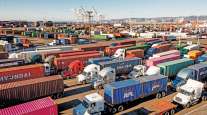Senior Reporter
Critical Talks to Begin for West Coast Port and Warehouse Workers

[Stay on top of transportation news: Get TTNews in your inbox.]
Labor Secretary Marty Walsh, seaport officials on the West Coast, International Longshore and Warehouse Union negotiators and leaders with the Pacific Maritime Association are talking optimistically that a long-term contract with workers can be negotiated this summer.
There are 70 different employers — shipping companies and warehouse companies — that do business at the 29 ports on the West Coast who work under the PMA’s master contract with the ILWU. A labor dispute could cause more disruption to the supply chain and damage the nation’s economy.
Negotiations begin May 10 in San Francisco. The current agreement covering more than 22,000 workers is set to expire July 1.

McKenna
However, PMA President Jim McKenna said it is possible it may take longer than late June to reach a deal and negotiations could extend into July with the current contract remaining in force.
“I expect the contract negotiations to go past July 1, they always do. In 2014 we had no real major issues on the table and it took us eight months after expiration with some slowdowns to get to an agreement,” McKenna said. “Each contract is different, but whether we go past July 1st or not is not the issue, we need to stay at the table and get an agreement without causing any further disruptions.”
The ILWU also has indicated talks could go on longer than the deadline, but its leadership also has emphasized it wants to get an agreement at the bargaining table.
McKenna made his remarks during a news conference with Eugene Seroka, executive director at the Port of Los Angeles, on May 6, when port officials reported processing an estimated 890,000 twenty-foot equivalent unit (TEU) containers in April — making it the second-busiest April in its history, trailing last April’s 946,000 TEUs.
On its website, the PMA listed five priorities for the talks:
- Engage in good-faith talks without a work disruption
- Provide longshore workers with world-class wages and benefits
- Prioritize safety and training
- Modernize terminals to handle cargo growth, including increasing automation at the ports, without reducing work opportunities for dockworkers
- Continue to meet stringent environmental regulations.
ILWU President Willie Adams sent an open letter to his members citing the need for a deal that protects both workers and the economy, but criticized efforts to automate marine terminals.

Adams
“Some of these shipping companies are also attempting to automate the U.S. terminals they lease — using robots instead of American workers to operate the heavy equipment that moves cargo,” Adams wrote. “Other ports have tried this and found that automation not only kills good jobs but does not move more cargo. In addition to a loss of jobs, automation poses a great national security risk as it places our ports at risk of being hacked as other automated ports have experienced.”
McKenna said as cargo volumes continue to surge, the union and management have added 1,000 new workers the past several months because of high container volume.
“I think the relationship between the two sides is very healthy,” McKenna said. “I think the pandemic and coming together and really working together has solidified things. Hopefully there will be no disruption to the fragile supply chain. I hope we don’t see any job action.”
In an exclusive interview with Transport Topics, Labor Secretary Walsh, a former union leader in Boston, said the agency is ready and willing to help the two sides negotiate a deal, but for now he’s monitoring the talks.
“I feel really positive right now as I talked to all sides in this conversation. And everyone is willing and open to getting an agreement as quickly as possible and moving forward,” Walsh said. “So certainly I’m not going to panic today. I feel good about where we are now. Who’s to say that six months from now there’s not a monkey wrench. But right now, I think it’s early days of negotiations. I don’t think it’s the right time to the naysayers to say, oh, this is going to go bad. That’s going to go bad. So I’m pretty confident that both sides are willing and able and certainly understand the magnitude of getting a contract.”
Want more news? Listen to today's daily briefing above or go here for more info
ILWU officials have said they believe they are beginning the negotiations from a strong bargaining position because of the work its members have done during the COVID-19 pandemic, keeping the critical facilities open, even as more than 1,700 workers became ill and two died from COVID.
McKenna acknowledged that and said the high-profile nature of the talks will mean both sides are committed to finding a workable solution.
“With all of the ships that are anchored, or slow-steaming towards us, right before a mid-term election, there is a lot of attention and a lot of focus by anybody and everybody,” McKenna said. “And I think we all realize that.”




